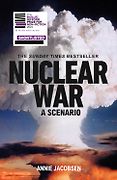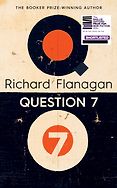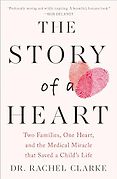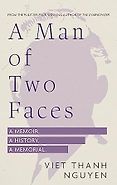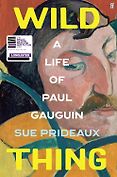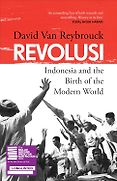For those who aren’t familiar with the Baillie Gifford Prize, could you tell us what kind of books you as judges, were looking for, for the shortlist?
The thing about nonfiction is that it is an extraordinarily broad category. It includes travel, biography, science, history, politics. At the beginning, you have a very wide range of possibilities, and you worry about two things. One is the judges not agreeing or having to compromise on a book that nobody’s happy with. The other is somehow missing a work of genius. At the first meeting, there is a massive room full of books. If a book got three stickers from separate judges it was taken into further consideration. We could also call in books. So, at the start, there was an enormous landscape of books.
What you then look for is a book that is compelling, that is very well written, and that really carries you through. And if it’s not carrying you through, the chances are it’s not carrying your fellow judges through. It’s a pretty brutal process of triage, from having 40 or 50 books on your personal list, down to where we are now.
As judges we are a fairly diverse group: we have a science writer, a literary editor, people who are authors. Everybody looks for something slightly different and a book that appeals across that range of interests is another way of filtering things out. For me, I tend to look for things that are telling me something, however they tell it, about today’s world. And there were a lot of books that did that. History does that, memoir does that, biography does that. You’re looking for relevance, which is part of the feeling of a book being compelling and carrying you through.
Let’s look at the six books that made the 2024 shortlist. Can we start with the scariest one? Tell me about Nuclear War: A Scenario by Annie Jacobsen and why it made the shortlist.
I read this book a couple of times and the second time I did have a pang of, ‘Hang on a minute! Is this really nonfiction?’ One of the interesting experiences of being a judge this year is that the category of nonfiction has become much more creative than it was.
The reason I asked myself that question is that this book is a scenario for what would happen if North Korea were to launch a missile at the United States. Now, fortunately, North Korea has not yet launched a missile at the United States, so everything that then happens in this book, hasn’t happened. But it is a scenario that is entirely based on documents, many of which have very recently been declassified, and on 10 years of interviews with people who were deeply engaged in the whole question of deterrence and of thinking about nuclear war and trying to prevent it. So the book is very rooted in fact.
She describes what happens if an unusual missile is launched. It’s picked up quite early and it’s tracked to determine where it’s headed. It’s heading for the United States. They try to intercept it. They fail. It hits Washington. Then what happens? Essentially, you have about half an hour from the beginning of the episode to the end of the world. It is utterly terrifying. It is about what can go wrong. It’s about what happens when deterrence, which is all we have to prevent nuclear war, fails and then the fail-safe, interception, also fails.
There’s also another launch from a submarine—also originating from North Korea—which is off the west coast of the United States. That hits a nuclear power plant and is a whole separate disaster. Because it’s a nuclear power plant, a different set of things happen.
The book told me lots of things I didn’t know or hadn’t thought about. For example, it is now clear that the United States is under nuclear attack from North Korea, and it responds. But to respond to North Korea, the missiles have to fly over Russia. What does Russia do? Russia interprets that as an attack from the United States. The fail-safe there is to get Moscow on the phone, which they try to do. After several attempts, they get through, and Moscow says, ‘Get your president to call our president.’ But by then, they’ve lost sight of the American president, because he was being evacuated from Washington when the bomb hit.
It’s a completely gripping but utterly terrifying scenario. It’s about the world we currently live in, an increasingly dangerous world, and it’s a really hard look at systems that we would probably rather not think about. It’s written very sparingly, very tellingly, very compellingly and you pretty much can’t put it down. You may wish you’d never read it, but you can’t put it down while you are reading it.
Let’s go on to the next book, Question 7 by Richard Flanagan. I suppose he’s best known for his historical novel, The Narrow Road to the Deep North, which won the Booker Prize.
There’s a connection with The Narrow Road to the Deep North because that book was also concerned with his father’s experience of being a slave laborer in the Second World War: he was an Australian captured by the Japanese. Question 7 also picks up on the nuclear theme, because Hiroshima is a key part of it. His father was unlikely to survive another winter. He was weak, he was exhausted, he was starving. It was also possible that the closing months of the war would have seen the slaughter of American and Australian prisoners at Japanese hands. His father was saved by the first nuclear bomb used by the United States on Japan, which helped to bring the war to an end. That meant he survived, and Richard Flanagan was born. In a curious way, Richard Flanagan owes his existence to the deaths of hundreds of thousands of people in the world’s first nuclear attack on Hiroshima.
That doesn’t make the use of nuclear weapons anything that can be defended, but the whole book is a meditation on the conundrum of life, of moral choices, on the connection between apparently unrelated things, on memory, on understanding. A lot of it is about his father and what he became after the war, and about his mother.
It’s also about Tasmania and genocide in Tasmania by settlers. It’s about the shame of being descended from a convict family in Australia. It’s about HG Wells and Rebecca West. It’s about the connection that he traces between HG Wells’s The War of the Worlds and an exiled Hungarian nuclear physicist who understood the idea of chain reaction. It came to him in a flash of insight and it led him to understand that splitting the atom would inevitably lead to a bomb.
Question 7 is the most extraordinary narrative which pulls together personal experience, the experience of his father, and revisiting sites that his father saw, meeting people—including Japanese former prison guards, people who were on the other side of his father’s experience—and then linking that through to both the cultural and the scientific history of the development and then the use of the bomb.
It is a memoir but of expanded consciousness. Again, you can’t really put it down. It’s beautifully written. It’s very original in the way it uses reflection and fact and personal stories.
I noticed the Financial Times review called it part memoir, part science, part history.
Yes, that’s true. And what holds this part memoir, part science, part history together is the personal thread. The book begins and ends with a kayaking accident the author, Richard Flanagan, has in a river in Tasmania. He is rescued, but only just. He describes this moment when he is floating above the river, looking down at himself. Is that death?
In the middle there is this extraordinary imaginative thread which, as I said, links his father’s experience, his own existence, and the wider history of the era, and does it beautifully.
Let’s talk about The Story of a Heart by Rachel Clark next. I read her book about working in a hospital in COVID, Breathtaking, but haven’t read this one yet. She’s a doctor who writes extremely well.
Yes, she writes extraordinarily well. I defy anyone who reads The Story of a Heart not to be moved by it.
It’s the story of a nine-year-old girl who was involved in a car crash and her parents are told that she’s brain dead. They immediately ask if she can donate her organs. Her heart goes to a boy who has a heart condition and is in hospital, waiting for a transplant. He’s being kept alive with a mechanical heart, and suddenly a heart is offered. The transplant is successful.
It sounds like a simple story, but she tells it extremely beautifully. She establishes a relationship with the family of both Keira and Max and, in the end, they meet. The parents of the donor, the little girl who died, are able to listen to her heart beating in the little boy whose life it saved. I have to tell you, as stories go, I am already beginning to weep just thinking about it.
Again, it’s a book that once read is never forgotten. It’s told with extraordinary insight, medical knowledge and extraordinary sensitivity to the people involved. She tells their story, of something we take for granted, heart transplants, in a way that I’ve never seen it told before. It’s profoundly moving.
Let’s go on to the next book, which is another memoir by a novelist. This is A Man of Two Faces by Viet Thanh Nguyen, whose novel, The Sympathizer, won the 2016 Pulitzer Prize.
This is another book that brought home to me how creative nonfiction has become. In terms of form, it’s very unusual. He refers to himself as ‘you’ throughout. So he talks about ‘your own failure, your this, your that’ when he means ‘I’, rather than the reader.
Again, it’s a meditation on his parents, who are Vietnamese Catholics. They came to the United States and ended up in California, where they raised their two sons. It’s about the experience of being a migrant. What decisions do you make as a second-generation migrant? Do you embrace your parents’ mother tongue? Do you embrace English? For someone who ends up being a prize-winning author, this is a key decision. What’s the relationship with writing? What’s the distance that comes with your parents? It happens with every adolescent, but it happens in very different ways for migrant families, because it’s about the breach with the ancestral culture. How far does that go? What sort of things are remembered, and what sort of secrets are kept?
He describes this from the perspective of the narrator but, as I said, in the second person. He’s playing a distant observer of his own emotions, feelings and choices. It’s not a formal, linear narrative at all. You feel you’ve entered into the stream of consciousness of somebody who is having this experience. And, curiously enough, it tells you more about the experience than it would have done with another narrative form. It seduces you into his thinking, his frame of mind, and his emotions in ways that are really illuminating.
Migration is a highly contemporary and contentious subject. I found it very illuminating not about migrants as the objects of political discourse, but migration as the subject. For that reason, I and my fellow judges felt it really earned its place on the shortlist.
Again, it’s a very original approach to memoir, that encompasses history, drama and indeed contemporary politics—although not entirely frontally. It’s not just about migration, it’s also a meditation on memory and reality and ‘what is truth?’ But it situates those questions that we all share in a context of biculturalism, of displacement, and of relationship with the past.
He went to the US age four, so it’s about his experience as an immigrant to the United States. Does the book also cover what happened to his parents in Vietnam, and some of the Vietnamese context?
It does a bit, although it’s mostly after that. There are visits back home. Those are told in the context of the relationship either of the parents or of the next generation to what is meant to be the ancestral past. That’s not entirely linear, because already in Vietnam, the parents had been moved to another province as part of a political movement. So they weren’t exactly leaving home in the straightforward sense.
Also, when they get to the United States, they very determinedly set their eyes on the future rather than the past. They do revisit, but very little. It’s a functional relationship in which they have obligations to family back in Vietnam, which they discharge, but you don’t have the sense that they ever imagine returning. People who migrate under other circumstances often imagine returning, but you don’t get the sense that this family does. It is a rupture, but it’s not a rupture that they try to repair. They set their face to the future.
Now we’re at the biography of Paul Gauguin by Sue Prideaux, Wild Thing. Tell me what it’s about and why it was a candidate for the shortlist.
It’s about one of the most important painters of his age, a man who helped to steer art towards post-Impressionism and was a huge influence on a whole generation. It’s also rather an extraordinary life about which I knew very little. The book is greatly assisted, I think, by a 200-page memoir which Gauguin himself wrote in the last two years of his life, which had been thought to be lost, but was rediscovered.
The contentious part of Gauguin’s life, which no doubt others are very well aware of, was his time in Tahiti. It had a huge influence on his art but was controversial because of his relationship with various very young women (and when I say young, I mean 13- or 14-year-olds). She goes into this in quite an interesting way, with an ethnographic eye on the relationship. She’s very non-judgmental. The attitude of people in Tahiti about marriage, about sexual relations, about the relationship of young women both to their families and to their partners, is both interesting and more complex than you might imagine. She also clears him of the charge that he introduced syphilis to Tahiti, which there’s no evidence for. This is demonstrated by the discovery of four of his teeth, which for some reason he kept. They were discovered relatively recently and subject to scientific analysis and there was no sign of the standard treatment for syphilis.
He was quite a difficult man. He changed partners fairly regularly. He had a marriage with several children, but decided to pursue his art, which took him away from his family. They relocated to Denmark and he came back to France.
It’s an extraordinary picture of a hand-to-mouth existence of someone of great talent, but talent which was slightly ahead of its time. He’s constantly trying to get involved in exhibitions which are going to solve or relieve the financial pressures that are upon him. You get a picture of quite a multinational group of artists in a similar situation, all looking at each other’s work, often trying to support each other and help each other, though not always.
He has a famous visit to van Gogh when van Gogh is clearly having a breakdown. Gauguin leaves just before van Gogh cuts off his own ear after threatening Gauguin with a razor. The book is full of incident and drama. And somehow, in the middle of this, Gauguin produced great art.
Sue Prideaux is a master storyteller and a wonderful biographer, and the book really argued its way onto the shortlist without much resistance.
Given the other books about Gauguin that are out there, including one or two historical novels loosely based on his life, I got the sense there’s a bit of rehabilitation going on in this biography—which she does quite persuasively.
She does do it quite persuasively. There is a lot of work here, a lot of context. There’s a lot of cultural understanding, and there is an effort at least, to allow the reader to make up his or her own mind, rather than the biographer dictating or mandating what view to take. She gives you a chance. You don’t have to accept the rehabilitation, but she certainly gives you a fair shot at it.
We’re at the last book on the shortlist now, which is about Indonesia. This is Revolusi by David Van Reybrouck, about the 20th-century struggle for independence in Indonesia, which the Netherlands had colonized. Is this the longest book on the shortlist?
Yes. Revolusi is an epic work, but it is a rather overdue one, because Indonesia is a hugely important country that has been very much neglected. The case that he is making is not only that we should care more about it because it’s a large country, with the world’s largest Muslim population etc. He also argues that the anti-colonial struggle in Indonesia was the first anti-colonial struggle. It triggered and set the tone for a whole series of anti-colonial struggles thereafter. The conference at Bandung in 1955 was the birth of the Non-Aligned Movement—another theme which is very much around at the moment. It’s time that we looked at the role that Indonesia played in shaping post-colonial thinking.
Again, it’s very beautifully done. It’s a monumental work, and it’s an extraordinary story. Not only was the struggle against the Dutch an extraordinary story, but Indonesia was also occupied by Japan in World War Two because of its resources, which included oil. Indonesia is a massive archipelago with dozens of languages and cultures so the complexities of any struggle are going to be rather greater than for a smaller and more coherent polity. It’s a miracle that it’s a country at all but, somehow, it has worked.
There’s a metaphor that he uses throughout the book. There’s a ship that sinks in the Java Sea, and he takes the shipboard metaphor of first-class, second-class and third-class passengers. Third class tends to be the Indonesians, but there are variations within all these classes. Sometimes somebody from one class ascends to the next one up, and someone from the second class might decline to the third class. It sounds like a banal metaphor, but the way it’s used through the book is very helpful, because revolutionary movements and loyalties are not necessarily simple. The whole book is shot through with the complications. There’s the mosaic of indigenous Indonesian cultures, the colonists and who they were, and then the people who are the product of relationships between the colonists and Indonesians. What are their loyalties? What role do they play?
Then you have the complications of Asian colonizers versus European colonizers, and the role the Japanese play. Not just in Indonesia, but also in Burma, the Japanese claimed they were a liberating force who were driving out European colonists. They then tended to become almost as brutal as the Europeans that they had driven out, or in some cases more so.
It’s a subtle and interesting book about a very important subject.
The fight for independence in Indonesia was brutal, I think, particularly after 1945.
Yes, it was long, complicated and brutal. Instead of the defeat of Japan and the end of the war leading to Indonesian independence, it led to an attempt by the Dutch to re-establish their colonial possession. The Dutch imagined that they would pick up where they left off and there was a lot of violence.
In several of this year’s shortlisted books, you have an experience of war, very much from the ground up. In Question 7 it’s about the experience of being a slave laborer in Japanese captivity. In Revolusi, Van Reybrouck talks to a lot of people who are now very old. There are a lot of eyewitness accounts and recollections. It’s about the direct experiences of ordinary people caught up in these terrible, violent events—what it meant, the decisions they made, whose side they chose to be on, if they had the luxury of choosing. It’s about the leaders who emerge and rise in those moments, who then shape the next stage of history, which was a critical and important one. He’s arguing not just that this was an extraordinary passage of resistance to colonialism and the emergence of independence, but it then went on to shape the experience or the ambitions of countries who were going through a similar process.
I’m never quite sure why we don’t hear more about Indonesia—at school, in the news, in discussions about foreign policy.
Funnily enough it may be partly because Indonesia was non-aligned. If you think that for a long time what we looked at was defined by the Cold War, Indonesia wasn’t a player in that sense. It is very large and very complicated.
I suppose it’s also because Indonesia never tried to be a great power. We tend to pay attention to countries that challenge global power arrangements. The Bandung Conference was trying to do the opposite. It was saying, ‘We are here, we are us, and we will define our allegiances and our futures ourselves and not as a function of the confrontation between the USSR and the USA.’ We’re seeing a similar sentiment with the US-China confrontation, another reason this book is relevant.
Could you expand on that?
If you think of the US-China confrontation as a rerun of the Cold War, where is Indonesia in this? It’s a producer of a critical mineral: it’s one of the largest producers of nickel in the world. And China has established a very strong position in Indonesia mining nickel, which America is now worried about. Again, we’re seeing a very large and important country in the context of a confrontation between two superpowers.
Thank you so much. It’s a great shortlist. Lots of very different books, but there are themes that run through them.
There are. The Story of a Heart is an outlier, but it just demanded to be there. Wild Thing also. But if you read them—as we did—in quick succession, you become aware of relationships. There’s a Zeitgeist feel to them. They’re very much about today, but each, in its own way, is drawing threads from the past.
Interview by Sophie Roell, Editor
November 15, 2024. Updated: December 2, 2024
Five Books aims to keep its book recommendations and interviews up to date. If you are the interviewee and would like to update your choice of books (or even just what you say about them) please email us at [email protected]
Five Books interviews are expensive to produce. If you've enjoyed this interview, please support us by donating a small amount.
